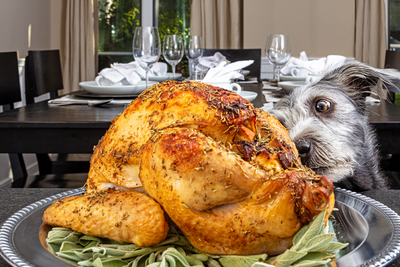The food you feed your pet is one of the most important parts of pet ownership. Without proper nutrition, your dog is not only at risk of developing health conditions but can also experience general discomfort and pain. The nutritional needs of dogs are similar to those of humans. However, dog nutrition has some special considerations—particularly for elderly dogs.
The best way to ensure that your senior dog's nutritional needs are met is to feed them the same food they ate when they were still in their prime. Keeping your dog on his original diet can help protect against complications from diet-related health issues, such as bowel and bladder problems, kidney disease, and even osteoarthritis.

That being said, your dog can develop vitamin and mineral deficiencies, even
when eating the same diet throughout their life. As your pet ages, their nutritional needs can change. Changes can mean that your pet might need more of certain vitamins and minerals. At the same time, their needs for other nutrients may be lower than they were in their youth.
Today, let's explore some of the best things to feed your elderly dog. Here's what you need to know:
Small Amounts of Fruit and Vegetables
As you may already know, dogs are carnivores. When your dog starts to age, though, it might be a good idea to sneak in a little bit of fruit or vegetable. Dogs' digestive tracts differ from ours, and they can tolerate fruits and vegetables better.
Fruit and vegetables don't hugely impact your dog's health, but they're an excellent way to keep your dog on a diet without making them feel like they’re on a diet. The most benefit you'll derive from giving your dog fruit or vegetable is adding some flavor to your dog's food.
It's best to feed your pet fruit or vegetable in small amounts—no more than 1/2 cup a day. Be careful with citrus fruits, such as oranges and lemons. They can be too acidic for your pet's stomach.
Herbivore-Friendly Treats

If you want to give your dog a treat, try to stick with wholesome grains and plant-based foods. Your dog will get the most nutritional benefit from treats made primarily of whole grains and legumes, such as soybeans.
Be careful not to overdo it, though. As we've already discussed, dogs' bodies can handle more fruit and vegetables, but they aren't necessarily healthy for your pet—especially if they get too much.
Supplements
Because your dog is getting older, his nutritional needs are shifting. As your dog gets older, he might need more of certain vitamins and minerals to help keep him healthy. That being said, adding vitamins and minerals to your dog's diet should be done carefully and under the advice of an animal nutritionist. Giving your dog too much of a vitamin or mineral can cause toxic reactions.
Fiber-Rich Food and Treats
When your dog starts to eat more, you might notice that their stool is much thinner than it was when they were a puppy. Or, you might notice that they aren't passing as much stool as they used to. This is because dogs don't digest fiber as well as humans do.
Dogs with lower fiber diets (or without fiber) can develop bowel problems and other conditions that can cause pain. For this reason, it's important to provide your dog with the right amount of food and treats that will help get the right amount of fiber into their system.
The Bottom Line
As your dog ages, it's essential to keep an eye on their nutritional needs. The key is working with an animal nutritionist to determine your dog's specific needs during this time. Then, adopt a feeding schedule to help meet their needs without causing your dog too much stress.Local pet store
If you are looking for the best local pet store, you’re in the right place. Here at Maggie’s Pet Boutique, you can find a wide range of products that will make your beloved pets happy! We offer pet-themed gifts, leashes, collars, apparel, and more for your furry friends. Browse through the store today and find what you’re looking for. Contact us to learn more!





